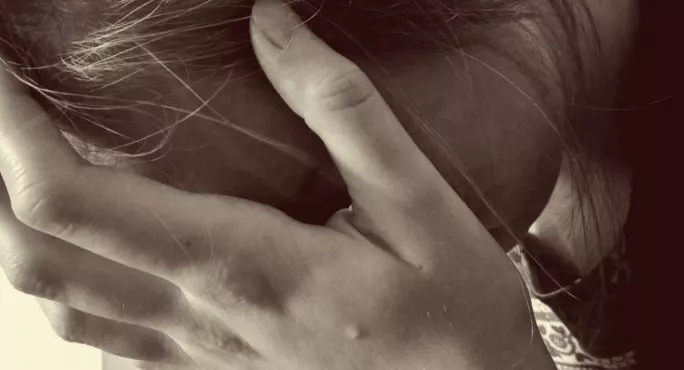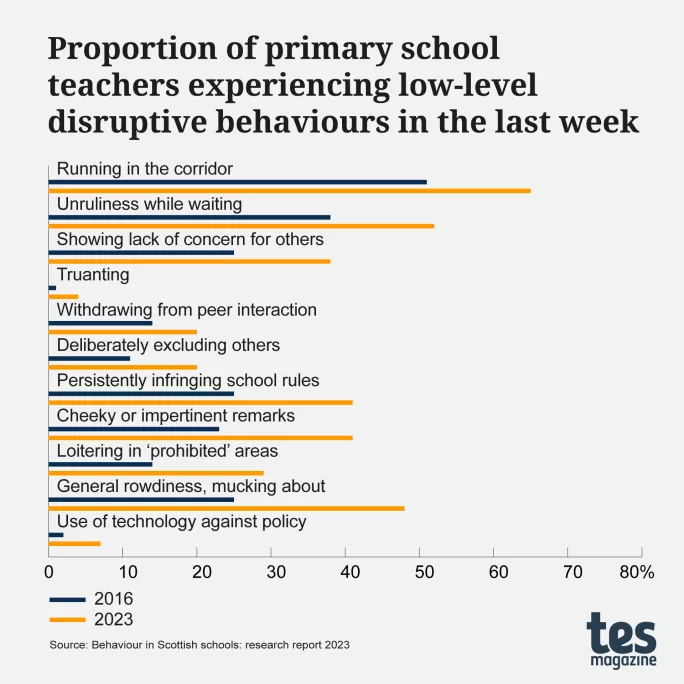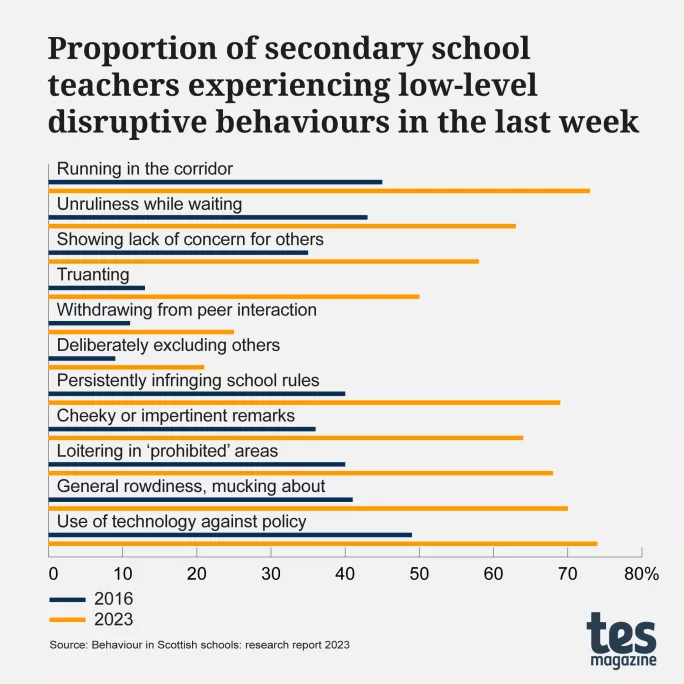Serious disruptive behaviour rising in Scottish schools

There has been “a general worsening of pupil behaviour” in Scotland since 2016, according to the fifth edition of the Behaviour in Scottish Schools Research (BISSR) report published today.
It finds that primary and secondary staff have experienced a decrease in positive behaviour - such as respecting communal areas and queuing in an orderly manner - and increases in low-level disruption, disengagement and serious disruptive behaviour in school.
While most staff in 2023 still perceive that all or most pupils are generally well behaved in school and in class, the research finds that perceptions of such positive behaviour among teachers and support staff have declined since 2016 (research on which led to a report in 2017) and since research into behaviour in schools began in 2006.
The research finds “a general trend” of worsening behaviour as pupils get older, with disruption and negative behaviours more commonly reported in secondary schools than primary schools.
The exceptions were physical aggression and violence, both directed at other pupils and towards staff: these were more often experienced in primary schools than in secondary schools. The report states that P1-3 teachers were more likely to encounter such behaviour than P4-7 teachers.
- Primary schools: Violence in Scottish primaries not ‘a rarity’, Gilruth told
- Headteacher view: Balance and boundaries are key to behaviour
- Long read: What’s behind Scotland’s ‘behaviour emergency’?
Some 525 schools took part in the research, and 3,754 school staff.
The proportion of both primary support staff and headteachers who reported experiencing physical violence towards themselves or other staff in the classroom in the previous full teaching week rose from 13 per cent in 2016 to 28 per cent in 2023 (support staff), and 15 to 30 per cent (heads).
Among primary teachers, the levels of physical violence reported were lower for support staff and headteachers in both 2016 and 2023. There was, however, a fourfold increase in the level of physical violence experienced by teachers, from 3 per cent encountering this at least once in the previous week in 2016 to 12 per cent in 2023.

In secondary schools, the proportion of staff having experienced physical violence towards themselves or other staff in the classroom at least once in the previous teaching week also increased: among support staff from 1 per cent in 2016 to 7 per cent in 2023; and among heads from 2 to 11 per cent. For secondary teachers, physical violence in the classroom rose from 0 to 3 per cent.
The abusive use of mobile phones and other digital technology was one of the most frequently experienced forms of serious disruptive behaviours experienced by secondary staff. Reports of students using digital technology abusively around the school have also risen among secondary teachers (14 per cent in 2016 to 27 per cent in 2023) but it is also a problem in the classroom: rising among support staff (17 to 27 per cent), teachers (10 to 27 per cent) and headteachers (34 to 45 per cent).
Other problem areas include verbal abuse towards staff, physical aggression and violence between pupils, and pupils being under the influence of drugs and alcohol. Reports from secondary teachers of encountering students under the influence of drugs or alcohol in the classroom at least once in the previous week have risen from 6 per cent in 2016 to 17 per cent in 2023.

The level of physical violence experienced around primary schools has doubled or nearly doubled since 2016, from 5 per cent to 10 per cent for teachers and 16 per cent to 30 per cent for headteachers.
Summit on violence
Behaviour in Scottish schools has been a growing concern in the wake of the pandemic. The Scottish Secondary Teachers’ Association has spoken about an “aggression epidemic” and a survey of almost 900 schools released by the EIS teaching union last week found almost two-thirds (63.2 per cent) reported violent and aggressive incidents were taking place on a daily basis.
In May, education secretary Jenny Gilruth announced a summit on violence in schools, to address rising concerns about behaviour, leading to a series of events - the latest taking place today.
Previous waves of BISSR took place in 2006, 2009, 2012 and 2016 but the most recent iteration of the report was delayed because of the Covid pandemic.
New and emerging patterns of challenging behaviour in 2023, according to the research, include vaping and in-school truancy, a rise in misogynistic views expressed by male pupils, and problematic use of mobile phones and social media.
The report says: “Another common theme in emerging issues in behaviour was that of sexist, misogynistic and explicitly sexualised language among male pupils, particularly related to the popularity of influencers. While only mentioned in a small number of secondary schools, school staff expressed great concern about this growing trend and its impact on girls, young women and female school staff members.
“Participants gave examples of male pupils directing abusive and sexist language and more disruptive behaviour towards female teachers in a way that they did not towards male teachers.”
School and local authority staff identified underlying reasons for the changes in behaviour found in the research. These included a perceived lack of consequences for pupils who engage in serious disruptive behaviour and a lack of support for pupils with additional support needs, particularly autism spectrum disorders and attention deficit hyperactivity disorder (ADHD).
‘Poor behaviour cannot be generalised’
Education secretary Jenny Gilruth discussed the findings of the report as she chaired the third behaviour and relationships summit, bringing together teachers, union representatives, local authorities and other parties.
She said that the research provided “important nuance” and showed that “most teachers report good behaviour among pupils”.
Ms Gilruth added: “Young people must not be demonised, and poor behaviour cannot be generalised. Our young people have faced a huge amount of disruption in recent years due to the Covid-19 pandemic, which has been compounded by the current cost-of-living crisis - this is not unique to Scotland.
“Tomorrow I will set out to Parliament our plans to engage with local authorities and schools to ensure a plan of action is taken forward to tackle instances of poor behaviour at the root as soon as possible.
“I plan to engage directly with young people on this matter to ensure their voices are front and centre - as well as with teachers and school staff, to ensure they are fully supported in responding to these challenges.”
EIS general secretary, Andrea Bradley, said both her union’s own research and the BISSR painted “a deeply worrying picture of a rising tide of disruptive behaviour, aggression and violence in Scotland’s schools”.
She said worsening behaviour had come about against a backdrop of “large class sizes, overworked teachers, rising levels of additional support needs and cuts to specialist provision”.
Register with Tes and you can read two free articles every month plus you'll have access to our range of award-winning newsletters.
Keep reading with our special offer!
You’ve reached your limit of free articles this month.
- Unlimited access to all Tes magazine content
- Save your favourite articles and gift them to your colleagues
- Exclusive subscriber-only stories
- Over 200,000 archived articles
- Unlimited access to all Tes magazine content
- Save your favourite articles and gift them to your colleagues
- Exclusive subscriber-only stories
- Over 200,000 archived articles



